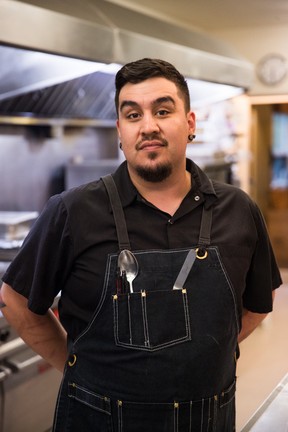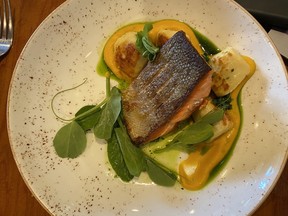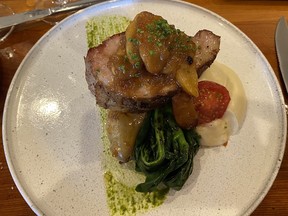Reviews and recommendations are unbiased and products are independently selected. Postmedia may earn an affiliate commission from purchases made through links on this page.
Chef Brodie Swanson celebrates, uplifts the flavours of Haida Gwaii

Haida Tourism executive chef charts a unique course — both in and out of the kitchen

Article content
Brodie Swanson looks back on his early memories of food with great fondness.
Advertisement 2
Article content
“I loved to cook and be in the kitchen just helping my mom out and my grandmother, especially,” Swanson, whose Haida name is Kil Tlaa’sgaa, says. “She had me in there peeling potatoes, doing little prep things to help her out for meals, and even processing foods.”
Through the two women, Swanson was introduced to a wide variety of foraging and preparation techniques ranging from harvesting, cleaning and jarring clams to gathering and dehydrating seaweed.
“We would also collect mussels and sea urchin to snack on and then, a lot of times, when we were cooking the mussels and other shellfish, we would take the liquid that we were putting it in and put that in the extra seaweed,” Swanson recalls with a soft smile.
It was those early memories, combined with an appreciation for cooking that continued to grow with age, that inevitably led Swanson down the path to become a professional chef.
Advertisement 3
Article content
“I felt it like a calling in my attachment and draw to the kitchen and food,” he admits of his career trajectory, adding it was a one that his siblings — two brothers and a sister — definitely did not hear.
“It’s funny, it’s almost as though I was raised in a completely different household because they don’t have the same relationship to food that I do,” Swanson says with a laugh.

Born and raised in Haida Gwaii, Swanson has spent a lot of time exploring the northern British Columbia islands’ bounty, working in commercial fishing, in the kitchens of remote lodges and foraging for things like spruce tips and berries.
The experiences, he says, have not only helped to further his understanding of the intrinsic connection between nature and food, but has also furthered his understanding of the many ways in which his Haida ancestors utilized the natural resources of the coastal islands to nourish themselves and their communities.
Advertisement 4
Article content
“For me, that was like reconnecting to how my ancestors used to live, even if it was just a little glimpse,” Swanson, who is a Yahgulanaas Raven Clan member, says.
Swanson left Haida Gwaii in 2010 in order to further his culinary education, moving to Vancouver where he worked under Chef Robert Belcham at Campagnolo and in the kitchen of the celebrated Indigenous-owned restaurant Salmon n’ Bannock.
Joining Haida Tourism in 2013, Swanson has more recently taken on the role of executive chef for the operation, which sees him oversee the menu creation and kitchens at both Haida House in Tllaal and Ocean House in Old Massett, both located on Graham Island.
His goal in the executive chef position is to further forge a tide-to-table offering at the properties, promoting and supporting local fishing and seafood processing — and aiming to introduce game meats such as venison, which Swanson says is a “staple” in Haida cuisine, to the menu.
Advertisement 5
Article content
“It’s something I believe that’s uniquely Canadian,” Swanson says of deer and other assorted wild game meats, which are currently illegal to serve in restaurants in most provinces. “To not have it in our kitchens and restaurants is doing a disservice to our culinary and creativity. Especially with the Michelin Guide coming to Canada.
“I feel if the government really wants to see Canadian food grow, that would then be in their best interest to allow it.”
For now, Swanson focuses on putting seasonal plates together that feature local ingredients, an increasing number of which come fresh from the garden.
At Haida House, an impressive garden project is underway “to help bring the land to life,” according to Swanson, with multiple beds and a full-time gardener overseeing the growing and harvesting of vegetables ranging from pea shoots to radishes.
Advertisement 6
Article content
Swanson says the initiative will work twofold, increasing his access to locally grown goods while also decreasing his dependence on the imported foods that often arrive inedible by the time they’ve made the journey to Haida Gwaii.
“It’s going to make our job in the kitchen so much easier,” he says. “Because, right now, I got an order on Monday and I had to call our supplier about the product that showed up that was unusable. From when it left Vancouver on Wednesday until it arrived at our door here on Monday — so that’s about five days — that was enough time for the produce or whatever we have in there to go bad.
“And then it shows up here and we have plans to use it and we can’t because it has turned.”
The menu already features some of the garden bounty. A divine seared salmon filet with pillowy house-made gnocchi featured pea shoots for a touch of green colour and taste.
Advertisement 7
Article content

A starter of house-made bread was also served with spruce tip butter picked from the forest right outside the lodge doors.
“We have our kitchen helpers that will come in at four o’clock and if it’s slow, and they get caught up, I’ll send them out for an hour to pick spruce tips, and then I’ll usually dehydrate them. I’ll make vinegars to make salad dressings. I’ll make powders to make the butters,” Swanson says of the new spring growth, which appears at the tip of the spruce tree branches.
“For me it’s citrusy. But also slightly astringent,” he adds of the flavour. “But I’m working on different ways to get that bitterness away that exists. Fermentation is one of them.”
Swanson is playing with the idea of spruce tip capers and spruce tip syrups as other uses for the new growth. He’s also eyeing the abundance of sea asparagus, a salt-tolerant succulent plant that grows along the beaches and riverbanks, as another menu addition.
Advertisement 8
Article content
“I have really grown to appreciate it not just as a garnish but as a seasoning,” Swanson says. “We blanch it or do a quick water shock, put it in nice, chill it down and then smoke it. And then dehydrate it. It makes an incredible seasoning.
“It’s kind of like a caper with the salinity but it’s more kelp-y. It’s really good on popcorn. And I’ve tested it on the plate because it’s a nice matcha green.”
Once the garden is producing steadily enough to meet the kitchen’s needs, Swanson says he’ll turn his eye to berries next.
“I’m actually looking to do a call really soon for berry pickers to start harvesting salmon berries and huckleberries,” he says.
In addition to solving the supply chain problem, he’s also keen to see a partnership with local growers and pickers produce more work for those who call Haida Gwaii home. As a member of the Haida band council in Old Massett, Swanson is well aware of the unemployment issues plaguing many individuals in the local population.
Advertisement 9
Article content
“Where I live, there’s up to 80-per-cent unemployment rates at certain times of the year, so 80 per cent of our population isn’t working or are underemployed,” Swanson says. “I really just want to make changes so there’s more opportunities for people and more housing, more training and more opportunities for our people to be a part of that. To not just exist but to have a connection to what Haida Gwaii offers the world.”
Swanson spoke of a plan to see fishing lodges — which he refers to as “resource-extractive companies” — exit Haida Gwaii in the future, making way for “modern Haida villages” where Indigenous people can learn about and live the way their ancestors did, immersed in nature and living off the land, while also welcoming in guests to experience the culture, food and history of the Haida nation.
Advertisement 10
Article content
“I think the best description that I’ve come up with so far is it would be the complete opposite of what a residential school was,” Swanson says of the repurposed lodges. “It’ll instil language and instil the culture back into our people and give them a sense of purpose in place in the world.”
When speaking with a local tour guide, Swanson’s name was mentioned, prompting an appreciative dialogue about what a “change-maker” he has become within the local community. When asked about this title, Swanson admitted he sometimes thinks about being considered a role model and leader — but he just can’t pause on it for too long.
“I didn’t realize how many young people were looking to what I was doing, and what I’m going to be doing, because I’m still not where I want to be. But I’m still working at it on a regular basis,” he admits. “But to be able to inspire any kind of young person to want to be a chef is icing on the cake, really.”
Advertisement 11
Article content
Another goal of Swanson’s is to create a Haida Gwaii Chef’s Society, in order to address some of the common concerns that the islands’ food community shares such as access to foods, seasonality and staffing shortages.
“We all face the same issues,” he says. “And the off-season is a whole different animal with the competition that happens between guys that are usually really friendly. They have to battle each other for the same clientele because the tourist season is huge for the island.
“And then sometimes in the off-season, when we don’t have that tourist number, it becomes a bit of a dog-eat-dog world.”
As if Swanson’s plate didn’t already sound full enough, he’s also working on a Haida House cookbook that’s he’s hoping to have finished by the end of the year. The book, he says, will break from the traditional “Western-style cookbook” model and instead will highlight the chef’s unique approach to seasonality and food.
Advertisement 12
Article content
“My objective being home is to kind of separate my Western influence from my Haida traditional side and then also, in that separation, it isn’t to keep them apart but to bring them together so they marry in a way that’s not so forced,” Swanson says. “That’s what I’ve been feeling, that I’ve been forcing things and just trying to make it happen and make it work. And I’ve had some good results and I’ve had some bad results.
“And I think it’s that experimentation where I wanted to get to — that’s where I want to be as far as cooking goes.“

With so much on the go, Swanson admits to sometimes feeling “rundown and tired.” But he operates using a motto of ‘slow motion is better than no motion,’ which undoubtedly helps him to feel that every move, decision and day is a step toward reaching his momentous goals — within the kitchen and beyond.
Advertisement 13
Article content
“I told our staff, you know, there’s gonna be long days, there’s gonna be tough days,” Swanson says. “But these are part of the growing pains of developing something of substance, you know. And that’s what I really feel and see.”
-

How to eat your way around Fort Langley
-

‘Canada’s best restaurant’ is right here in Vancouver
-
![Sea bass with oyster velouté, fried oyster from the Restaurant at Poplar Grove. Photo: Mia Stainsby. For Mia Stainsby's restaurant review on May 19, 2022. [PNG Merlin Archive]](https://smartcdn.gprod.postmedia.digital/vancouversun/wp-content/uploads/2022/05/0519-stainsby-4_270059118-w.jpg?h=96&strip=all&quality=80)
Review: Okanagan wineries offer some of the region’s best food
-

Time to dine outside: Best restaurant patios around Metro Vancouver
More news, fewer ads, faster load time: Get unlimited, ad-lite access to the Vancouver Sun, the Province, National Post and 13 other Canadian news sites for just $14/month or $140/year. Subscribe now through the Vancouver Sun or The Province.
Source: vancouversun.com


